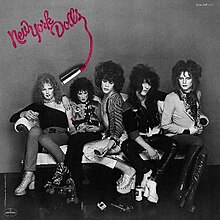| New York Dolls | ||||
|---|---|---|---|---|
 | ||||
| Studio album by | ||||
| Released | July 27, 1973 | |||
| Recorded | April 1973 | |||
| Studio | The Record Plant (New York) | |||
| Genre | ||||
| Length | 42:44 | |||
| Label | Mercury | |||
| Producer | Todd Rundgren | |||
| New York Dolls chronology | ||||
| ||||
| Singles from New York Dolls | ||||
| ||||
New York Dolls is the debut studio album by the American rock band New York Dolls, released on July 27, 1973, by Mercury Records. An influential precursor to the 1970s punk rock movement, the eponymous album has been acclaimed as one of the best debut records in rock music and one of the greatest rock albums ever.
In early 1973, the two-year-old band had developed a local fanbase by playing regularly in New York City's lower Manhattan, but most music producers and record companies were reluctant to work with them because of their vulgarity and onstage fashion as well as homophobia in New York. Still, the Dolls signed a contract with Mercury and recorded their first album at the Record Plant in New York with producer Todd Rundgren, who was known for his sophisticated pop tastes and held a lukewarm opinion of the band. Despite stories of conflicts during the recording sessions, lead singer David Johansen and guitarist Sylvain Sylvain later said Rundgren captured how the band sounded live. The resulting music on the album – a mix of carefree rock and roll, influences from Brill Building pop, and campy sensibilities – explores themes of urban youth, teen alienation, adolescent romance, and authenticity, as rendered in Johansen's colloquial and ambiguous lyrics. The album cover featured the members in drag for shock value.
New York Dolls received acclaim but sold poorly and polarized listeners. The band proved difficult to market outside their native New York and developed a reputation for rock-star excesses while touring the United States in support of the album. Despite its commercial failure, New York Dolls helped shape the 1970s punk rock movement; the group's crude musicianship and youthful attitude challenged the prevailing trend of musical sophistication in popular music, particularly progressive rock.